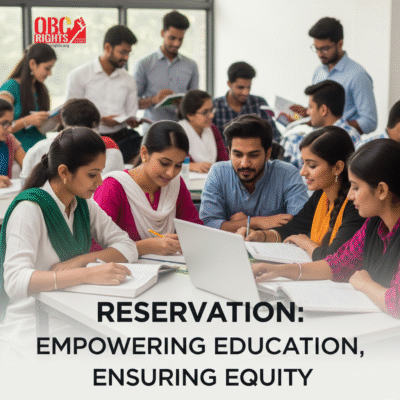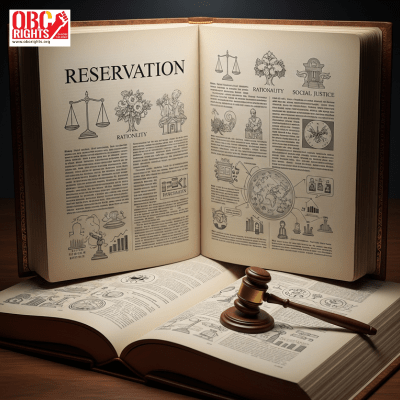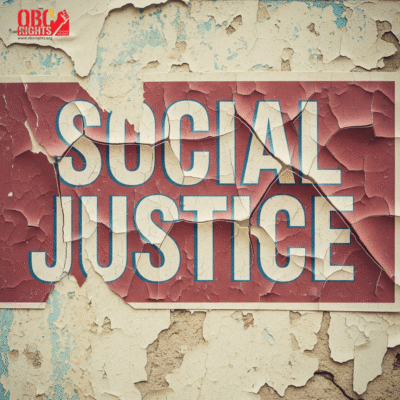We often hear people say, “Why does ‘Reservation ‘continue still? But before we jump to answers, let’s ask a deeper question: Why was it started at all? In a country where talent shines everywhere but opportunities don’t, can we really say the playing field is fair? Reservation was never a free pass—it was a way to correct generations of injustice. It wasn’t about giving anyone more, but about giving everyone a fair shot. Yet today, as debates rage on, some call it outdated or overused.
But before we rush to judge whether it’s outdated or overextended, we must ask: What were the objectives/vision behind it? And more importantly, have those goals been fulfilled? Let’s explore the core objectives and ideals that necessitated and shaped the Reservation Policy in India.
What’s the Main Purpose of Reservation?
The reservation system in India is mainly to ensure equality. Think of life like a race—some people have had to start way behind others, not because they’re less capable, but because of the hardships their families and communities have faced for generations.
A reservation gives facilitation to such people. This restricted facilitation is provided in education, jobs, and politics, so they can compete more equally with others.
For a long time, many communities in India were treated unfairly and denied opportunities or access to education. They were not given proper access to schools, good jobs, or a voice in decision-making. The reservation policy is meant to shatter these old injustices and make sure everyone gets a fair chance to move forward in life.
Understanding the Roots of Reservation:
India’s caste system created big gaps in society. For hundreds of years, communities like Dalits (now called Scheduled Castes), Adivasis (Scheduled Tribes), and Other Backward Classes were treated unfairly. They were not allowed to go to school, own land, enter temples, or be considered for good jobs. Because of this, they had limited chances to improve their lives. Moving up in society was nearly impossible for them.
Early Steps in the South: The Justice Party and Tamil Nadu
Even before India became independent, some leaders in the South saw how unfair the system was. In 1920s, the Justice Party in Tamil Nadu (then called Madras Presidency) started reservation policies to help non-Brahmin castes get seats in government jobs and schools.
This was one of the first real steps towards equal opportunity, and thus, the concept or policy of reservation came in.
Constitutional Foundation: A Promise of Equality
When India became a republic in 1950, the makers of the Constitution recognized the essential need to uplift marginalized communities. Articles 15(4) and 16(4) were added to allow the state to make special provisions for socially and educationally backward classes. It has been made a Fundamental Right.
Dr. B.R. Ambedkar, the chief architect of the Constitution, knew that mere formal equality wasn’t enough. Marginalized communities needed special support to rise to an equal standing.
Kaka Kalelkar Commission (1953) – First Backward Classes Commission
This was India’s first national-level effort to identify backward classes. While it submitted a report in 1955 recommending reservations for OBCs, the recommendations weren’t implemented due to a lack of proper classification and clarity.
Mandal Commission (1979) – Second Backward Classes Commission
The Commission, headed by B.P. Mandal, collected socio-economic data and found that OBCs made up around 52% of India’s population but remained severely underrepresented in education and public employment.
The 1980 report recommended 27% reservation for OBCs in central government jobs and educational institutions, and the government implemented it in 1990. This significantly broadened the scope of reservation beyond SCs and STs.

Key Objectives of the Reservation Policy:
Promoting Social Inclusion
Reservation helps ensure that schools, jobs, and leadership roles include people from all communities. This builds a more equal and united society.
Equal Opportunity, Not Equal Treatment
Everyone doesn’t start from the same place. Reservation gives a fair chance to those who have faced more struggles, without lowering standards.
Upliftment of Marginalized Communities
SCs, STs, and OBCs were denied rights for centuries. Reservation Policy helps them get access to education, jobs, and dignity. Many still need it because they continue to face discrimination and poverty.
Representation in Education and Jobs
Most leadership roles were once held by a few castes. Reservation gives MBCs, DNCs, and other backward groups a fair chance to learn, grow, and lead. But many people still underrepresent themselves today.
Social Equality and Real Justice
Even if laws state that everyone is equal, discrimination still happens. Reservation empowers those whom society has excluded, helping to build true equality in real life.
Conclusion
Reservation was never about giving special treatment—it was about repairing the damage of the past and creating a future for the neglected. As long as inequality and exclusion exist, the objectives behind the reservation policy remain relevant.
The real question is not whether we need reservations, but how we can make them more effective, inclusive, and targeted—to ensure that India’s growth includes all its people, not just a few.
Let us be aware of our Constitutional Rights! Unite – Fight – and Achieve! Create a formidable ladder to our (OBC) Youth!



